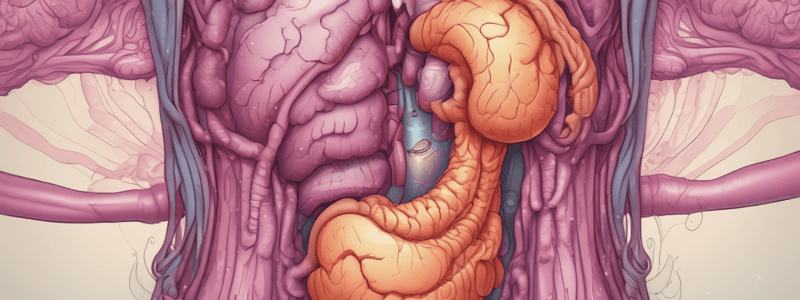Podcast
Questions and Answers
What is the clinical feature of Crohn's disease that involves the presence of red, tender bumps under the skin?
What is the clinical feature of Crohn's disease that involves the presence of red, tender bumps under the skin?
- Rectal bleeding
- Anemia
- Diarrhea
- Skin changes (correct)
Which of the following is NOT a common symptom of Crohn's disease?
Which of the following is NOT a common symptom of Crohn's disease?
- Abdominal pain
- Rectal bleeding
- Frequent urination (correct)
- Feeling of tiredness and lack of energy
How is Crohn's disease commonly diagnosed using invasive procedures?
How is Crohn's disease commonly diagnosed using invasive procedures?
- Full ileocolonoscopy with biopsies (correct)
- MRI scanning of the gastrointestinal tract
- Physical examination of the abdomen
- Serological markers like C-reactive protein
Which of the following is a non-invasive diagnostic procedure commonly used in the assessment of Crohn's disease?
Which of the following is a non-invasive diagnostic procedure commonly used in the assessment of Crohn's disease?
What are some common factors that may worsen the symptoms of Crohn's disease?
What are some common factors that may worsen the symptoms of Crohn's disease?
Which of the following is a characteristic of Crohn's disease related to the gastrointestinal tract?
Which of the following is a characteristic of Crohn's disease related to the gastrointestinal tract?
What is a common dietary recommendation for managing Crohn's disease?
What is a common dietary recommendation for managing Crohn's disease?
Which of the following is NOT a potential complication of Crohn's disease?
Which of the following is NOT a potential complication of Crohn's disease?
Why is an interprofessional team approach considered essential in managing Crohn's disease?
Why is an interprofessional team approach considered essential in managing Crohn's disease?
Which treatment option is considered for Crohn's disease if it is severe or refractory?
Which treatment option is considered for Crohn's disease if it is severe or refractory?
What is the potential consequence of untreated Crohn's disease that affects the gastrointestinal tract?
What is the potential consequence of untreated Crohn's disease that affects the gastrointestinal tract?
Why is a low-fat, high-fiber diet often recommended for individuals with Crohn's disease?
Why is a low-fat, high-fiber diet often recommended for individuals with Crohn's disease?
Flashcards are hidden until you start studying
Study Notes
Crohn's Disease: A Comprehensive Guide
Introduction
Crohn's disease (CD) is a chronic inflammatory bowel disease (IBD) that involves the gastrointestinal tract. It is characterized by a transmural granulomatous inflammation that can affect any part of the GI tract, most commonly the ileum, colon, or both. The prevalence of CD has been increasing worldwide, with the highest incidence reported in northern Europe, the United Kingdom, and North America.
Symptoms
Crohn's disease can cause a wide range of symptoms, including:
- Diarrhea
- Abdominal pain
- Rectal bleeding
- Fever
- Weight loss
- Fatigue
- Anemia
- Eye redness or pain
- Skin changes (red, tender bumps under the skin)
Stress and certain foods, such as high-fiber foods and carbonated drinks, may worsen symptoms.
Diagnosis
Crohn's disease is a clinical diagnosis formed by correlating clinical signs and symptoms. Diagnostic procedures include:
- Full ileocolonoscopy with biopsies
- Less invasive imaging modalities (e.g., magnetic resonance enterography or computed tomography)
- Serological markers (e.g., C-reactive protein, erythrocyte sedimentation rate, or fecal calprotectin)
No single gold standard investigation exists for the diagnosis of CD.
Treatment Options
Treatment for Crohn's disease typically includes:
- Dietary and lifestyle modifications
- Medications (e.g., corticosteroids, immunosuppressants, and biologic agents)
- Surgical intervention (in case of severe or refractory disease)
Dietary Considerations
Dietary modifications can help manage symptoms and improve overall well-being. A low-fat, high-fiber diet is often recommended, along with avoiding certain trigger foods (e.g., dairy, caffeine, and alcohol).
Complications
Crohn's disease can lead to complications such as:
- Colon cancer (increased risk)
- Osteoporosis
- Anemia
- Nutritional deficiencies
- Depression
- Infections
- Perianal lesions other than hemorrhoids
Conclusion
Crohn's disease is a chronic inflammatory condition that affects the gastrointestinal tract and can cause a wide range of symptoms. Diagnosis is based on clinical signs and symptoms, and treatment often involves a combination of dietary modifications, medications, and surgical intervention. Regular monitoring and an interprofessional team approach are essential for managing the disease and its complications.
Studying That Suits You
Use AI to generate personalized quizzes and flashcards to suit your learning preferences.



